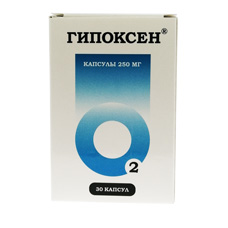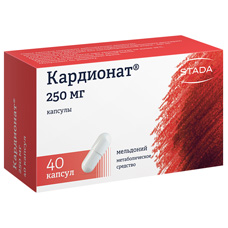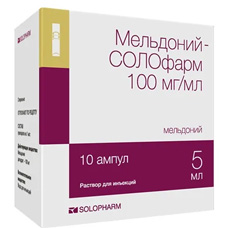
Mildronate®
Pharmacologic action :
metabolic, cardioprotective, antihypoxic, psychostimulating;
In high load conditions MILDRONATE® restores the balance between the demand of cells for oxygen and its delivery to the cells, eliminates the accumulation of toxic metabolic products in cells, protecting them from damage; also has a tonic effect. As a result of its use, the body acquires the ability to withstand stress and quickly restore energy reserves.
Indications
- Sport. Please read How to use Mildronate in sports ( also in Spanish )
- complex therapy of IHD (stenocardia, myocardial infarction);
- chronic heart failure and cardiomyopathy with dyshormonal disorders;
- complex therapy of acute and chronic disorders of the blood supply to the brain (stroke and cerebrovascular insufficiency) ;
- reduced working capacity, physical stress, includingin athletes.
- abstinence syndrome in chronic alcoholism (in combination with specific alcoholism therapy)
- hemophthalmos and retinal hemorrhages of various etiologies;
- thrombosis of the central retinal vein and its branches;
- retinopathy of different etiology (diabetic, hypertensive)
There is insufficient data on the use Mildronate for children.
Owner of the product registration certificate: JSC "Grindeks". St. Krustpils, 53, Riga, LV-1057, Latvia.
Tel.: +371 67083205; fax: +371 67083505.
Email: grindeks@grindeks.lv

Name in Cyrillic:
МилдронатActive substance:
MeldoniumMeldonium is a structural analog of gamma-butyrobetaine, a substance that is placed in every cell of the human body.
Pharmachologic effect:
In high load conditions Meldonium restores the balance between the demand of cells for oxygen and its delivery to the cells, eliminates the accumulation of toxic metabolic products in cells, protecting them from damage; also has a tonic effect. As a result of its use, the body acquires the ability to withstand stress and quickly restore energy reserves.
Due to these properties,Meldonium is used to treat various disorders of the cardiovascular system, blood supply to the brain, as well as to increase physical and mental performance. As a result of a decrease in the concentration of carnitine, gamma-butyrobetaine, having vasodilating properties, is intensively synthesized. In the case of acute ischemic myocardial damage, Meldonium slows down the formation of a necrotic zone, shortens the rehabilitation period. In case of heart failure, it increases myocardial contractility, increases exercise tolerance, and reduces the frequency of angina attacks. In acute and chronic ischemic disorders of cerebral circulation, Meldonium improves blood circulation in the ischemic focus, promotes blood redistribution in favor of the ischemic area. The drug eliminates functional disorders of the nervous system in patients with chronic alcoholism with withdrawal symptoms.
Pharmacokinetics:
Taken orally Meldonium is well absorbed. Bioavailability is about 78%. Cmax is achieved in 1-2 hours.
The bioavailability after intravenous administration is 100%. Cmax in blood plasma is reached immediately after its administration.
Meldonium is metabolized in the body with the formation of 2 main metabolites, which are excreted by the kidneys. T1/2 is 3-6 hours.
Indications:
complex therapy of ischemic heart disease (stenocardia, myocardial infarction);
chronic heart failure and cardiomyopathy with dyshormonal disorders;
complex therapy of acute and chronic disorders of the blood supply to the brain (stroke and cerebrovascular insufficiency);
hemophthalmos and retinal hemorrhages of various etiologies, thrombosis of the central retinal vein and its branches, retinopathy of various etiologies (diabetic, hypertensive);
reduced performance;
mental and physical overload (including in athletes) (meldonium can cause a positive result during doping control (see "Special instructions");
withdrawal syndrome in chronic alcoholism (in combination with specific therapy).
Contraindications:
hypersensitivity to the components of the drug;
increased ICP (with impaired venous outflow, intracranial tumors);
pregnancy;
lactation period;
age up to 18 years (efficacy and safety have not been established).
Use with caution:
liver and / or kidney disease.
Pregnancy and breast-feeding:
The safety of use in pregnant women has not been studied, therefore, in order to avoid possible adverse effects on the fetus, use is contraindicated.
Meldonium penetration into milk and its effect on the health of the newborn have not been studied, therefore, if necessary, breastfeeding should be discontinued.
Side effects:
Rarely - allergic reactions (redness, rash, itching, swelling), as well as dyspeptic symptoms, tachycardia, decrease or increase in blood pressure, agitation.
Very rarely - eosinophilia, general weakness.
Interaction:
Can be combined with antianginal drugs, anticoagulants, antiplatelet agents, antiarrhythmic drugs, diuretics, bronchodilators.
Meldonium strengthens the action of cardiac glycosides.
Due to possible development of moderate tachycardia and arterial hypotension, caution should be exercised when combined with nitroglycerin, nifedipine, alpha-blockers, other antihypertensive drugs and peripheral vasodilators, because Meldonium enhances their effect.
Dosing and Administration:
CAPSULES :
Due to the possible development of an exciting effect, it is recommended to use it in the first half of the day and no later than 5:00 p.m. when taken several times a day.
Ischemic heart disease (stenocardia, myocardial infarction), CHF and dyshormonal cardiomyopathy: as part of complex therapy, 500-1000 mg per day, using the entire dose at once or dividing it by 2 times. Treatment course: 4-6 weeks.
Dyshormonal cardiomyopathy: as part of complex therapy, 500 mg per day. The course of treatment is 12 days.
Subacute and chronic disorders of the blood supply to the brain (after a stroke, cerebrovascular insufficiency): as part of complex therapy after the end of the course of injection therapy with Meldonium, the drug is continued to be taken orally at 500–1000 mg per day, using the entire dose at once or dividing it into 2 doses. Treatment course: 4-6 weeks.
For chronic disorders: as part of complex therapy, 500 mg orally per day. General course of treatment: 4-6 weeks. Repeated courses (usually 2-3 times a year) are possible after consulting a doctor.
Reduced performance, mental and physical overload (including in athletes). Adults - 500 mg 2 times a day, course of treatment: 10-14 days. If necessary, the treatment is repeated after 2-3 weeks. Athletes - 500-1000 mg 2 times a day, before training. The duration of the course in the preparatory training period is 14–21 days, during the competition period - 10–14 days.
Withdrawal syndrome in chronic alcoholism (in combination with specific therapy) 500 mg 4 times a day. The course of treatment is 7-10 days.
INJECTION:
Intravenously, intramuscular and parabulbar. Due to possible development of an exciting effect, it is recommended to take it in the morning.
The route of administration, doses and duration of the course of treatment are set individually, depending on the indications, the severity of the condition.
1. Cardiovascular diseases (as part of complex therapy):
- Ischemic heart disease (myocardial infarction) intravenous stream, 0.5–1.0 g per day (5–10 ml of Meldonium;
- ischemic heart disease (stable angina pectoris); CHF and dyshormonal cardiomyopathy: intravenous stream, 0.5–1.0 g per day (5–10 ml of Meldonium) or intramuscularly 0.5 g, 1–2 times a day, course of treatment 10–14 days, with the subsequent transition to dosage forms for oral administration. The general course of treatment is 4–6 weeks.
2. Violation of cerebral circulation (as part of complex therapy):
- acute phase - 0.5 g each (5 ml of Meldonium) 1 time per day i.v. for 10 days, switching to dosage forms for oral administration. The general course of treatment is 4–6 weeks. ;
- chronic insufficiency of cerebral circulation (discirculatory encephalopathy) 0.5 g (5 ml of Meldonium) intramuscularly or intravenously 1 time per day for 10 days, followed by switching to dosage forms for oral administration. The general course of treatment is 4–6 weeks. Repeated courses (usually 2-3 times a year) are possible after consulting a doctor.
3. Ophthalmopathology (hemophthalmus and retinal hemorrhages of various etiologies, thrombosis of the central retinal vein and its branches, retinopathy of various etiologies (diabetic, hypertensive). including used as part of combination therapy.
4. Mental and physical overload. 0.5 g (5 ml of Meldonium ) i/m or i/v 1 time per day. The course of treatment is 10-14 days. If necessary, the treatment is repeated after 2-3 weeks.
5. Chronic alcoholism. 0.5 g (5 ml of the drug Meldonium) i/m or i/v 2 times a day. The course of treatment is 7-10 days.
Overdose:
Symptoms: a decrease in blood pressure, accompanied by headache, tachycardia, dizziness and general weakness.
Treatment: symptomatic.
Meldonium is low-toxic and does not cause adverse reactions hazardous to the health of patients.
Special instructions:
Since January 1, 2016, meldonium has been included in the list of prohibited substances of the World Anti-Doping Agency (WADA)
Manufacturer:
Grindex (Latvia)
Mildronate®
in Cyrillic : Милдронат
SUBSTANCE
Meldonium
DOSAGE FORM
capsules, ampoules
MANUFACTURER
In Stock
available pack options :
| 500mg x 60 capsules | $57.70 | |
| 250mg x 40 capsules | $39.10 | |
| 5ml x 10 ampoules (100mg/ml) | $52.20 |




